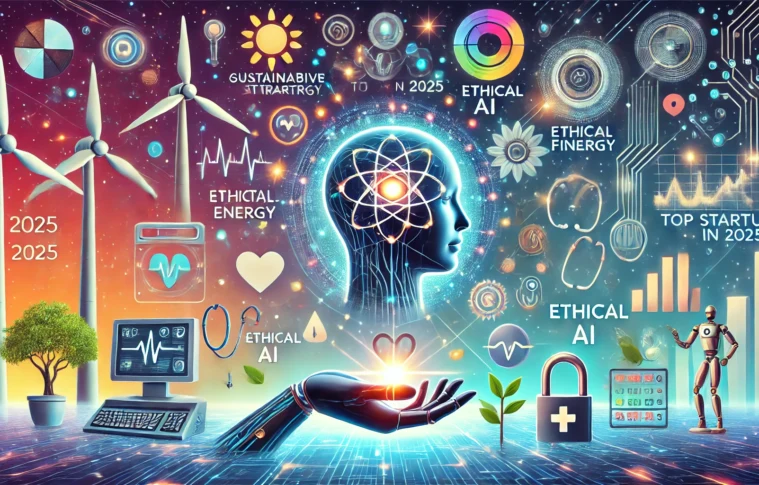As we approach 2025, the startup ecosystem continues to evolve, driven by technological advancements, shifting consumer behaviors, and global challenges. Startups that align with these trends are poised to disrupt industries, attract investment, and redefine markets. Here’s a look at the top startup trends that are expected to shape the business landscape in 2025.
1. Generative AI Startups
Generative AI, fueled by advancements in machine learning and natural language processing, remains a game-changer. Startups leveraging generative AI are creating tools for content creation, personalized experiences, and problem-solving across industries. From AI-driven marketing to creative tools for design and media, this field is a hotbed of innovation.
- Opportunities: Personalized customer experiences, automated workflows, content generation.
- Key Example: AI-powered writing assistants or design tools.
2. Sustainability and Climate Tech
Climate-focused startups are gaining traction as governments and consumers demand sustainable solutions. Innovations in renewable energy, carbon capture, and circular economy models are expected to dominate.
- Opportunities: Green technology, zero-waste products, energy-efficient solutions.
- Key Example: Startups creating biodegradable materials or renewable energy storage systems.
3. Healthtech and Wellness
The pandemic reshaped how people view health and wellness. Startups are innovating in areas like telemedicine, mental health platforms, personalized nutrition, and wearable health tech.
- Opportunities: Remote healthcare services, AI-driven diagnostics, mental health support apps.
- Key Example: Platforms that combine wearable tech data with AI for predictive healthcare.
4. Web3 and Decentralized Solutions
While the hype around cryptocurrencies has settled, Web3 innovations continue to thrive. Startups focusing on decentralized finance (DeFi), blockchain-based identities, and secure data storage are on the rise.
- Opportunities: Decentralized applications (dApps), blockchain-as-a-service (BaaS), tokenized assets.
- Key Example: Platforms offering decentralized solutions for secure online transactions.
5. Creator Economy Platforms
The creator economy continues to grow as individuals monetize their skills and passions. Startups enabling creators with tools for monetization, audience engagement, and content distribution will see significant growth.
- Opportunities: Creator management tools, direct-to-fan monetization, AI-driven content analysis.
- Key Example: Platforms helping creators launch their subscription-based communities.
6. EdTech Evolution
Education technology startups are transforming learning experiences. Innovations like virtual reality (VR)-powered learning, AI-based tutors, and upskilling platforms are bridging the gap between traditional education and modern skill demands.
- Opportunities: Gamified learning, virtual classrooms, AI-driven assessments.
- Key Example: Apps offering skill-based certifications tailored for emerging industries.
7. Hyperlocal Solutions
Startups focusing on hyperlocal delivery, localized content, and community-driven services are addressing unique needs in specific regions. From groceries to neighborhood-focused apps, this trend highlights the importance of local market understanding.
- Opportunities: On-demand services, regionalized e-commerce, hyperlocal advertising.
- Key Example: Delivery platforms catering to underserved or remote areas.
8. Autonomous and Smart Mobility
The transportation industry is ripe for innovation. Startups working on autonomous vehicles, electric mobility solutions, and urban air mobility (e.g., drones and flying cars) are gaining traction.
- Opportunities: EV charging networks, last-mile delivery automation, drone-based logistics.
- Key Example: Startups offering autonomous delivery bots.
9. Financial Inclusion and FinTech
FinTech startups are focusing on financial inclusion, particularly in underserved regions. Solutions like micro-lending, digital wallets, and AI-driven credit scoring are empowering individuals and small businesses.
- Opportunities: Embedded finance, AI-based fraud detection, decentralized banking.
- Key Example: Apps offering accessible financial tools for unbanked populations.
10. Human-Centric AI and Ethics
As AI becomes more pervasive, ethical concerns are pushing startups to focus on transparency and fairness. Human-centric AI startups aim to ensure their products are unbiased, transparent, and privacy-respecting.
- Opportunities: Explainable AI, ethical AI tools, privacy-first platforms.
- Key Example: AI startups offering tools to audit algorithmic decisions.
How Startups Can Thrive in 2025
To succeed in these emerging trends, startups should:
- Stay Agile: Quickly adapt to market needs and emerging technologies.
- Focus on Customers: Build solutions that address genuine pain points.
- Leverage Partnerships: Collaborate with other startups, corporates, or governments.
- Prioritize Sustainability: Align with global efforts toward a greener future.
Conclusion
2025 promises to be a year of rapid innovation and disruption, with startups at the forefront of technological and societal change. By aligning with these trends, entrepreneurs can create impactful businesses that resonate with customers, attract investors, and redefine industries.
Are you ready to embrace the future?
Disclaimer
Posts in the Notebook are written by individual members and reflect personal insights or opinions. Please verify any information independently. If you have any concerns, notify the admin immediately so we can take action before any legal steps are taken.





